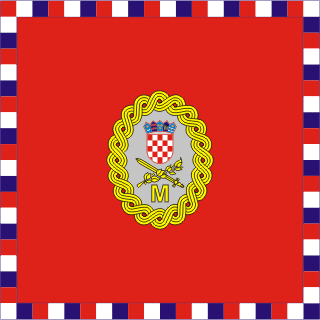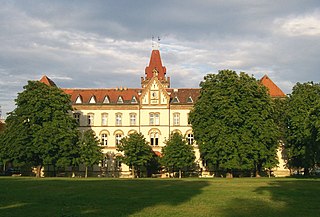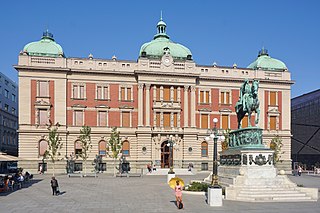Related Research Articles

Croatia has been a member of the European Union since 2013.

Negoslavci is a village and a municipality in Vukovar-Syrmia County in eastern Croatia. It is located south of the town of Vukovar, seat of the county. Landscape of the Negoslavci Municipality is marked by the Pannonian Basin plains and agricultural fields of maize, wheat, common sunflower and sugar beet.

The ministry of Defence of the Republic of Croatia is the ministry in the Government of Croatia which is in charge of the nation's military. It is Croatia's ministry of defence. The ministry was established in 1990.
The ministry of Foreign and European Affairs of the Republic of Croatia is the ministry in the Government of Croatia which is responsible for the country's foreign relations, its diplomatic missions and relations to international organisations, especially the European Union.

The Ministry of the Interior of the Republic of Croatia is the ministry in the Government of Croatia which is in charge of state security among other roles. Croatian Police is a public service of the Ministry of the Interior.

Egypt recognized newly independent Croatia on 16 April 1992 and the two countries established diplomatic relations on 1 October 1992. Egypt has an embassy in Zagreb. Croatia has an embassy in Cairo and an honorary consulate in Alexandria. Croatia's Cairo embassy also officially handles the countries of Bahrain, Ethiopia, Yemen, Jordan, Qatar, Kuwait, Lebanon, Oman, Saudi Arabia, Syria, Sudan and the UAE, as well as Djibouti, Eritrea and Iraq in certain matters. Both countries are members of the Union for the Mediterranean.
The ministry of Economy of the Republic of Croatia is the ministry in the Government of Croatia which is in charge of the development of the economy, and conducting administrative and other tasks related to:
The ministry of Maritime Affairs, Transport and Infrastructure of the Republic of Croatia is a ministry in the Government of Croatia.

The ministry of Construction, Spatial Planning and State Property of the Republic of Croatia is the ministry in the Government of Croatia which is in charge of construction.
The Ministry of Science, Technological Development and Innovation is a ministry in the Serbian government. It originally existed as the ministry of science from 1991 to 2004 and then under various different names from 2004 to 2011, when it was merged into the education ministry. The ministry was re-established as a separate entity with the formation of the third cabinet of Ana Brnabić on 26 October 2022.
The ministry of Labour and Pension System, Family and Social Policy of the Republic of Croatia is the ministry in the Government of Croatia which performs administrative and other tasks related to employment policy, regulation of labor relations, labor market and active employment policy, system and policy of pension insurance and relations with trade unions and employers associations in the area of employment relations.

The Constitution of Croatia in its preamble defines Croatia as a nation state of ethnic Croats, a country of traditionally present communities that the constitution recognizes as national minorities and a country of all its citizens. National minorities explicitly enumerated and recognized in the Constitution are Serbs, Czechs, Slovaks, Italians, Hungarians, Jews, Germans, Austrians, Ukrainians, Rusyns, Bosniaks, Slovenes, Montenegrins, Macedonians, Russians, Bulgarians, Poles, Romani, Romanians, Istro-Romanians ("Vlachs"), Turks and Albanians. Article 12 of the constitution states that the official language in Croatia is Croatian, but also states that in some local governments another language and Cyrillic or some other script can be introduced in official use.

Mima Simić is a Croatian writer, an awarded film critic, translator and an LGBTIQ+ media activist. She holds degrees in Comparative Literature and English Language and Literature from the Faculty of Humanities and Social Sciences, University of Zagreb and Gender Studies from the Central European University. Simić was Croatia's first openly out LGBTIQ+ political candidate.

Andrea Bekić is a Croatian diplomat, current Ambassador Extraordinary and Plenipotentiary to The Swiss Confederation. Formerly, she was Croatian Ambassador to The Republic of Poland.

The Ministry of Human Rights and Refugees of Bosnia and Herzegovina is the governmental department which oversees the human rights of the citizens of Bosnia and Herzegovina and refugees.
Vladimir Međak is a Serbian Jurist and an expert in European law and European integration. He is currently the Vice President of the European Movement in Serbia and a former Assistant Director of the Office for European Integration of the Government of Serbia.

The State Mortgage Bank of Yugoslavia was a major state-owned financial institution in the Kingdom of Yugoslavia during the interwar period.

Croatia held the presidency of the Council of the European Union during the first half of 2020. The presidency was the last of three presidencies making up a presidency trio, which began with the presidency of Romania, followed by that of Finland. It was the first time Croatia had held the presidency; the country acceded to the European Union in 2013.
The Croatian Customs Administration is the national administrative organization within the Ministry of Finance of the Republic of Croatia whose basic task is the application of customs, excise, tax and other regulations.

Gabrijela Žalac is a Croatian politician. She served as Minister of Regional Development and EU Funds from 2016 to 2019.
References
- ↑ Blažević, Robert (2015): Upravna znanost, p. 284. ISBN 9789538034039
"...(on day 19. February 2015)." - ↑ "Državni proračun 2015. godina". mfin.hr. Retrieved 24 April 2015.
- ↑ "Ministarstvo regionalnoga razvoja i fondova Europske unije - O Ministarstvu". Archived from the original on 2015-03-15. Retrieved 2015-04-24.